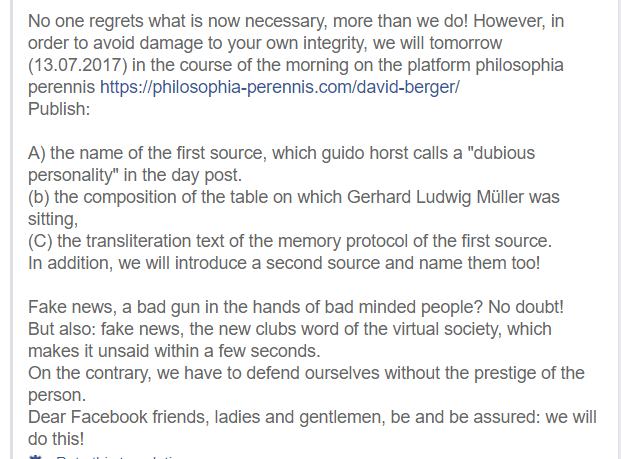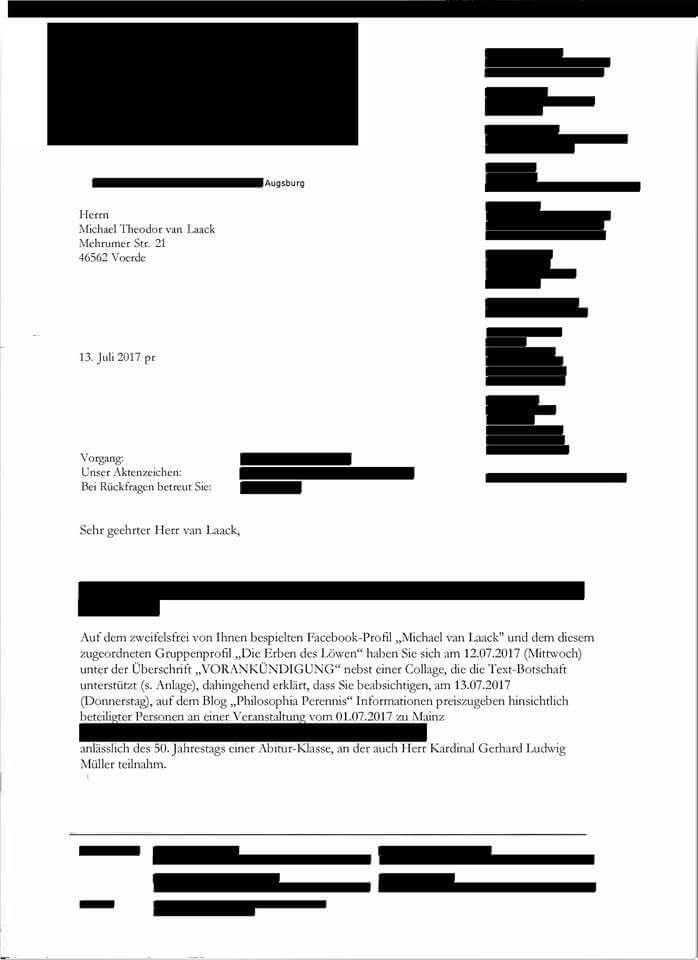We have become aware of a story — an anecdote published three years ago in a Swiss Capuchin journal and never denied by the Vatican — relating a conversation between the pope and an unnamed archbishop in which the pope is alleged to have said that he has “the keys” to the female priesthood.
Before examining that anecdote, some history of papal overtures on this topic is in order. As our readers might already know, OnePeterFive has been attentive to the possibility that Pope Francis has designs to allow women access to Holy Orders — even, somehow, to become (purportedly) ordained priests. One of the earliest indications of his interest in this matter came in 2015, when the pope recommended to the German bishops during their Ad Limina visit in Rome that they read the books of Fritz Lobinger, himself an open promoter not only of married priests, but also of female priests.
The following year his intention to investigate the possibility of a female diaconate was raised during a papal encounter with female religious superiors. As we reported:
On May 12, 2016, during a meeting with 800 women serving as general superiors of religious orders from around the world, Pope Francis surprised Catholics everywhere when he announced that he was preparing to set up a commission to investigate “deaconnesses” in the early Church — a proposal that came in response to a question as to whether such women might have a role in 21st century Catholicism.
Over the following year, several more milestones along this path were noted. Perhaps most significantly was a 2017 article in the Vatican-approved magazine, La Civiltà Cattolica, in which deputy editor Fr. Giancarlo Pani, SJ, called into question the definitiveness of Pope John Paul II’s closing of the door to women priests, and in which it was suggested (by way of a quote from the progressive Vatican II theologian Fr. Yves Congar) that “the absence of a fact is not a decisive criterion for concluding prudently in every case that the Church cannot do it and will never do it.”
Additionally, when Pope Francis, in 2017, gave his first interview to a German newspaper (Die Zeit) and then opened himself up to the idea and even the option of ordaining certain viri probati (“proven men”) to the priesthood, he also made the following odd comment:
Many parishes have brave women: they keep up the Sunday and celebrate liturgies of the word, that is to say without the Eucharist. The problem, however, is the lack of vocations. [emphasis added]
While, at the time, many observers were already concerned about his specific words on the viri probatiquestion, the added matter of women acting out some parts of the priestly role might also have a more ominous and permissive meaning in itself. Pope Francis certainly does not seem here to hesitate to praise women for playing a part in the Church’s various liturgies.
In August of 2017, Professor Thomas Schirrmacher, a Protestant theologian with very good ties to the Vatican – and himself a participant at the 2015 Synod of Bishops on Marriage and the Family – revealed in an interview that Cardinal Gerhard Müller refused to head the newly founded Commission on the Female Diaconate. Professor Schirrmacher said: “[Cardinal] Müller rejected it [i.e., to head up the Female Deacon Commission]; he saw it as an entrance door for the topic of the ordination of women.” [emphasis added] According to Christa Pongratz-Lippitt of La Croix International, Schirrmacher — who “had numerous private conversations with Francis” during his work at the Synod — believes that “Cardinal Gerhard Müller was dismissed as prefect of the Congregation for the Doctrine of the Faith (CDF) because of his public criticism of Pope Francis, especially on the issue of women deacons.” [emphasis added]
Finally, we have the controversial and contested story of an alleged set of questions posed by the pope to Müller before his dismissal. As the story went, Cardinal Müller had allegedly told some of his friends during a meal in Mainz – only two days after his own sudden dismissal as the Prefect of the Congregation for the Doctrine of the Faith at the end of June 2017 – that Pope Francis among other questions had asked whether he was in favor of, or against, female priests. Though the reconstruction of events as we presented it was denied by Cardinal Müller, the substance of the issues of contention it related has never been specifically addressed. It also found backing in the person of Michael van Laack, a German Catholic theologian who, after our report was published, claimed in a Facebook post to have his own sources confirming the story and his intent to make the details known. A screenshot of his post (auto translated from German) can be seen here:
Van Laack, however, was immediately sued upon announcing his intent to publish what he knew — with the threat of a 100,000 euro fine — and thus intimidated into being silent. Though the parties who initiated the litigation were not revealed, he nevertheless posted a redacted image of the letter he received the very next day after his post:
If there was no story to tell, one wonders why such an aggressive effort was made to keep Mr. van Laack silent. Since the announcement of that legal case, Mr. van Laack has not published any information about this story. He also does not respond to our inquiries. We still hope that he will soon recover and publish his additional information on this whole matter, especially considering the arguable urgency of the content.
In light of all these little pieces of evidence, we return to the anecdote of the “keys” to female ordination. The pertinent story was published in April of 2014 by ITE, the journal of the Swiss Capuchin Order, and it was related by its editor, Brother Adrian Müller. In his editorial for that April 2014 issue, which was dedicated to Pope Francis, Brother Adrian relates how there are to be found in Rome many anecdotes about the new pope, about which claims one is, however, not fully sure as to whether they are true. “But,” adds Brother Adrian, “they surely also contain some truth about Francis [….] Thus, the following story has been reported to me from the circle around the Swiss Guard.” Let us here now present and consider that short, but possibly revealing, story about Pope Francis:
Pope Francis does not reside in the papal apartment but, rather, in the Vatican’s guest house [Santa Marta]. There the [Swiss] Guards have the duty to protect the pope or, sometimes, when he sticks his head out of his door, to fetch some coffee for him. The new bishop of Rome does not like to eat his breakfast alone. Therefore, he usually then sits down each time next to a person and starts talking with him. On one such occasion, the following encounter reportedly took place:Pope Francis is said to have sat down one morning in front of an archbishop and turned the conversation to the topic of the female priesthood. What was the archbishop himself thinking about that, he then asked of his table companion. He [the archbishop] fell silent and really did not know what to do with this question. After a period of silence, Francis is said to have responded: “Yes, yes, both of my predecessors have closed for us the door to it.” Then he [the pope] laughed and said: “Luckily, I have the keys to it.”
The author of this report, it is obvious, had no inclination at all to present this story as a troubling story or in any critical light. On the contrary, the editor himself playfully concluded, as follows: “I myself am truly looking forward to see which keys the successor of Peter now truly has. And here I do hope that he will be able to open some doors of the so-called blockages to reform.”
The Vatican Press Office has not responded to our request for comment on the matter, though our inquiry was made weeks ago.
So we, too, must be left — for the time being — with another uncertain feeling as to what newly proposed and experimental reforms the pope has in store for us.


